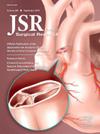局部晚期直肠癌观察和等待后的生活质量和功能结局:一项荟萃分析
IF 1.7
3区 医学
Q2 SURGERY
引用次数: 0
摘要
观察和等待(W&;W),包括全面的新辅助治疗,然后密切观察,已经成为局部晚期直肠癌患者获得临床或接近完全缓解的全肠系膜切除术的替代方案。该方法旨在保护肠道功能并避免根治性手术相关的发病率。方法本系统评价和荟萃分析遵循系统评价和荟萃分析首选报告项目和Cochrane指南。符合条件的研究包括随机试验和局部晚期直肠癌患者的观察性研究,这些患者接受全面新辅助治疗,随后进行W&;W或全肠系膜切除术。主要结局是生活质量(QoL),使用经过验证的工具进行评估(欧洲癌症研究和治疗组织生活质量问卷- c30,生活质量问卷- cr29,大便失禁生活质量)。次要结局包括未行造口术患者的肠功能,采用验证的测量方法,如克利夫兰诊所佛罗里达大便失禁评分、Vaizey、纪念斯隆凯特琳癌症中心和低前切除术综合征评分。在没有语言和日期限制的情况下,对PubMed、EMBASE、Medline和Web of Science(2023年9月至2025年5月)进行了全面的检索。摘要/全文筛选、数据提取和偏倚风险评估由两位审稿人独立进行。meta分析采用随机效应模型下的反方差加权。不适合meta分析的数据以叙述方式综合。结果在617项被筛选的研究中,28项得到全面审查,9项符合纳入标准(共923例患者)。荟萃分析5项研究(n = 601),组间总体生活质量无统计学差异(合并平均差= 0.10,95%可信区间:- 0.19 ~ 0.39,P = 0.49)。然而,对四项研究(n = 384)的大便失禁评分进行汇总分析,结果显示W&;W具有显著优势(汇总平均差= - 1.10,95%可信区间:- 1.50至- 0.73,P < 0.001)。定性综合低前切除术综合征评分结果有利于W&;W.结论W&;W在不影响生活质量的情况下提供了功能优势。考虑到潜在的功能益处和肿瘤风险,进行W&;W治疗的决定应个体化。本文章由计算机程序翻译,如有差异,请以英文原文为准。
Quality of Life and Functional Outcomes After Watch-and-Wait for Locally Advanced Rectal Cancer: A Meta-Analysis
Introduction
Watch-and-wait (W&W), which involves total neoadjuvant therapy followed by close observation, has emerged as an alternative to total mesorectal excision for patients with locally advanced rectal cancer who achieve a clinical or near-complete response. This approach aims to preserve bowel function and avoid the morbidity associated with radical surgery.
Methods
This systematic review and meta-analysis followed Preferred Reporting Items for Systematic Reviews and Meta-Analyses and Cochrane guidelines. Eligible studies included randomized trials and observational studies of patients with locally advanced rectal cancer treated with total neoadjuvant therapy, followed by either W&W or total mesorectal excision. The primary outcome was quality of life (QoL), assessed using validated instruments (European Organization for Research and Treatment of Cancer Quality of Life Questionnaire-C30, Quality of Life Questionnaire-CR29, Fecal Incontinence Quality of Life). Secondary outcomes included bowel function among patients without an ostomy, using validated measures such as Cleveland Clinic Florida Fecal Incontinence Scores, Vaizey, Memorial Sloan Kettering Cancer Center, and low anterior resection syndrome scores. A comprehensive search of PubMed, EMBASE, Medline, and Web of Science (Sept 2023-May 2025) was performed without language or date restrictions. Abstract/full-text screening, data extraction, and risk of bias assessments were conducted independently by two reviewers. Meta-analyses used inverse-variance weighting under a random-effects model. Data unsuitable for meta-analysis were synthesized narratively.
Results
Of 617 screened studies, 28 were reviewed in full and 9 met inclusion criteria (total 923 patients). Meta-analysis of five studies (n = 601) with no statistically significant difference in overall QoL between groups (pooled mean difference = 0.10, 95% confidence interval: −0.19 to 0.39, P = 0.49). However, pooled analysis of fecal incontinence scores from four studies (n = 384) showed a significant advantage for W&W (pooled mean difference = −1.10, 95% confidence interval: −1.50 to −0.73, P < 0.001). Qualitative synthesis of low anterior resections syndrome scores outcomes favored W&W.
Conclusions
W&W, offers a functional advantage without compromising QoL. The decision to pursue W&W should be individualized, considering both the potential functional benefits and the oncological risks.
求助全文
通过发布文献求助,成功后即可免费获取论文全文。
去求助
来源期刊
CiteScore
3.90
自引率
4.50%
发文量
627
审稿时长
138 days
期刊介绍:
The Journal of Surgical Research: Clinical and Laboratory Investigation publishes original articles concerned with clinical and laboratory investigations relevant to surgical practice and teaching. The journal emphasizes reports of clinical investigations or fundamental research bearing directly on surgical management that will be of general interest to a broad range of surgeons and surgical researchers. The articles presented need not have been the products of surgeons or of surgical laboratories.
The Journal of Surgical Research also features review articles and special articles relating to educational, research, or social issues of interest to the academic surgical community.

 求助内容:
求助内容: 应助结果提醒方式:
应助结果提醒方式:


